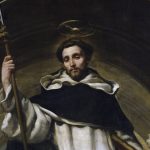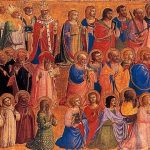Some of these I will take as priests and Levites. (Is. 66:21)
About twenty-five years ago, when I’d go home and visit my mother, she’d have priestly vocation articles placed strategically throughout her house. She never mentioned them, nor said, “You need to read these articles.” And I seldom, if ever, did. The poor woman. She tried and prayed so hard. She still does.
One visit, she had a book displayed on the kitchen table titled The Grunt Padre. It was about a priest named Vincent Capodanno who was a Marine chaplain during the Vietnam War. “Grunt” is not a very flattering adjective—pigs grunt as they roll around in the dirt and the mud. For Marines, though, being called a “grunt” was the highest of compliments. It meant they accepted you into their highly selective group.
Why was Fr. Capodanno accepted by the Marines? Was he large, loud, and gregarious? Was he a back-slapper who told stories and jokes and drank beer with the young troops? No, Fr. Capodanno was quiet and gaunt. In fact, pictures of him in Vietnam show him to be quite emaciated. What was it about him then that earned the love and reverence of the Marines he served?
Well, when those scared young men, most of whom were 19 or 20 years old, went on missions in the jungle, they’d spot the priest silently walking with them. At first, they probably said, “Why is he here?” or “How did he even get here?” but later on, they’d say, “I’m glad he’s here.”
Do you see how it worked? This priest did not wait for them back at base and then smile at them after their return, offering a prayer or a pat on the back. That would have been nice but probably wouldn’t have meant much to men who’d just returned from a taste of hell. The screams of monkeys, machine guns, and dying men would give them nightmares for the rest of their lives. People who go through things like that generally are not quick to trust or open up to others, to people who weren’t there with them on those missions, people who didn’t see the evil they saw . . . or the evil they committed.
What made the difference is that Fr. Capodanno didn’t just talk the talk, he walked the walk. And he didn’t just go on any mission; he went on the most dangerous ones. His superiors told him that if he was going to keep going on missions, then he’d have to bring a “chaplain’s assistant,” a dedicated bodyguard. But the priest refused—he would not have a man die trying to protect him. No doubt some argued that Capodanno, who never carried a gun, had a death wish.
A fellow chaplain, a Presbyterian, mentioned that men of all faiths would gather around when Fr. Capodanno offered Mass. The Presbyterian minister was awed by the way Capodanno lifted the chalice. He said that he did it so gracefully and intently, as if the act of consecration was emanating from the priest’s own heart.
That’s because it was. When a priest offers Mass, he is standing in for Christ, in persona Christi. It can be no other way, for it is Christ, and no mere man, who is our mediator and savior. So, at Mass, a priest’s heart is configured to Christ’s sacred heart. The priest then is not just the priest; he is also the victim of the sacrifice.
This was not the case with the old Jewish priesthood, which repeatedly offered the blood of bulls and goats. As Bishop Sheen wrote: “It’s easy to shed someone else’s blood. It’s easy to spend someone else’s money. The animal lost its life, the priest who offered it lost nothing.”
In the late summer of 1967, the Marines found themselves ambushed and surrounded by 2,500 communist soldiers. As one injured Marine lay on the ground, eyes closed, and preparing for death, he felt someone touch his face. He opened his eyes, and there was a bloodied Fr. Capodanno looking at him. Capodanno had been running from wounded to wounded, offering courage and the sacraments. He said to the injured man: “Stay quiet and calm, Marine. You will be okay. God is with us all this day.”
The man described a feeling of peace that came over him like he had never felt before or since. After this interaction, Capodanno ran a short distance to an injured medic and shielded him as 27 machine-gun bullets ripped through Fr. Capodanno’s back, killing him. That was September 4, 1967.
Capodanno’s cause for sainthood was started in 2002, the year that the book, The Grunt Padre, was published. Miracles have been documented through his intercession. 2002 was also the year the priest sex abuse crisis exploded in the media, revealing the rot and filth at work in the priesthood. My mother of course knew I was repulsed by all this. That’s why I reckon she put that book on her table. Perhaps she figured it would give me the courage to enter the dangerous jungle of seminary, which had become infiltrated with sexually confused men, decimating vocations to the priesthood.
Fr. Capodanno’s cause for sainthood was halted in 2022. The authorities in Rome explained: “With ongoing military actions in the world today, raising someone from the military for veneration may not be appropriate for our Church.”
In less than two weeks, our Church will canonize two young men: Carlos Acutis and Pier Georgio Frassati. Unlike gaunt, quiet priests with death wishes, these saints had good personalities and were welcoming, non-offensive, and non-threatening. They appear to be much more appropriate for our kinder and gentler Church, which is running out of priests due to lack of vocations.
My friends, Christ is calling you to your vocation. Will you be accepted into His highly selective group? Only if you walk the walk. After all, many are called, few are chosen.
Much of the world, headed on a broad highway to hell, regards Christ’s invitation as offensive and threatening. A person on the narrow path sees it as perfect love and justice. Which way do you see it? What are the facts? A priest wrote:
Every intelligent person must accept facts, and it is a fact that life in this world, from Adam and Eve onwards, has been very far from the ideal of perfect happiness, and as long as he is on this earth, man will have as travelling companions sorrow, illness, contradiction, and finally death.
Accept those facts, endure your trials with discipline, and take heart and courage, for Christ the High Priest has a death wish. Quiet and gaunt, with His back ripped to shreds from scourging, He walks the walk up the narrow path to Calvary. And He wants you to pick up your weapon—your cross—and walk the walk with Him. As your travelling companion, He silently walks with you on your dangerous mission during your very short tour of duty on earth.
This fact, this death wish, is all re-presented for you at Holy Mass where we proclaim Christ’s death, a universal sacrifice in unbloodied vessels. Here, people from the east and west, north and south come and recline at table in the kingdom of God. We recline at our altar rail where, with our eyes closed, Christ touches us and strengthens our drooping hands and weak knees. In the silence, we can hear Him say: Stay quiet and calm. You will be okay. God is with us all this day.
Image from Wikimedia Commons

















